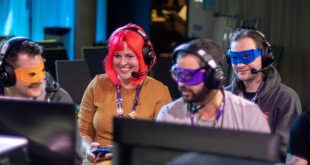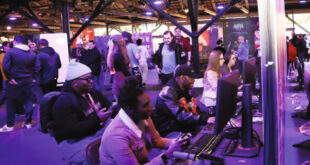Wired Productions’ MD Leo Zullo reflects on a wild and exciting period for the indie publisher, one that’s been dominated by eclectic and unusual game announcements that see the company as keen to embrace the new as it remains committed to the old.
The summer events season is well underway, bringing with it the usual slew of new announcements and new looks at imminent games. With the big names largely keeping to their own spotlights and the crowds kept at bay, it was again a time for indies to take the spotlight, none more so than Watford’s own Wired Productions. Managing Director Leo Zullo takes us back to the beginning of a busy summer and looks ahead to a milestone year.
How have you found ‘not-E3’ this year?
We used the “E3 but not E3” as a tag and had some fun with it. This year was better than the last two years, with the knowledge that you have to be part of a digital showcase. If you managed to get featured, it was good. Luckily, we had a good spread across the main events, so it was a good period for us.
The bigger question is whether E3 still has any relevance. I’m not so sure.
This period of streaming events over real ones seems to have been a real boon for indie publishers? Has it been for Wired? What have the numbers been like?
There are real benefits to digital events. The sheer numbers of eyeballs that get to see your content is a huge multiple verses going to physical events. It has been hard to track every digital event and which ones have the best results, so the last two years have been a lottery at times. But considering we have all been benched it was a godsend. It also levelled the playing fields a bit, and gave indie games a massive boost in visibility.
I still love physical events though, but even though we have done a few this year including PAX East, they are not back to full speed and the ROI is currently terrible.
I think the future will be a mix of digital only, physical only, and hybrid. Without giving details on which outlet, some of the streams reach three million viewers combined. A trailer in an event will get up to half a million, and in tangible results a great event can mean anywhere.

You’ve made a flurry of announcements over the summer. What has been the response like?
We pushed the campaign button on all our games and have seen wishlists grow by up to 300 per cent for certain games. It is tough to cut through the noise but thankfully the quality and diversity of the games has helped. Every game has benefited from the team play approach, with multiple games pushing across multiple channels, and thankfully cross promoting each other. This period was needed, even for our team as well as the developers to see tangible results from the promotion machine.
Have you been surprised by the response to any of the games announced?
We had very different games drop demos at PAX East and at Steam Next Fest, and all of them saw an immediate increase to wishlists and pre-orders. The Last Worker was loved by the masses especially because of its anticorporation message – people love a good message!
Gori: Cuddly Carnage got the adrenaline pumping for many … a cat on a hoverboard, chopping off evil unicorns’ heads … what’s not to love? Tin Hearts stole the hearts of the classic puzzle gamer who wants multi-layers to their game. Last but not least Arcade Paradise… it is just ridiculously addictive. The line-up won various awards at shows and being in various top five and top ten lists, so the effort of shows and demos can be worthwhile.
What excites you most about the games Wired has lined up over the coming months?
Ultimately, our line-up is from teams that we really believe in; they are original, diverse and titles that deserve to be played. Each game is very different, each game has a unique point to it, and each developer has a great back story. Our games are like a set of eclectic and talented children, so it is hard to say one game is more exciting than another.
You’ve just released the next gen update of Deliver Us The Moon. Has the game been given a new lease of life on the back of the sequel’s announcement?
Deliver Us The Moon has continued to deliver, and we are not stopping. The next gen updates will have just gone live, a Stadia version recently launched, and later in the year there will be a Luna version. The work we are doing will help Frontier and KeokeN for the sequel, and visa-versa. It is always helpful to be on good terms with partners.

It’s great to see Tin Hearts nearing completion – an underrated VR gem coming good at what looks to be an exciting time for VR, perhaps?
Tin Hearts has been built for flat as well as VR, but the immersion within VR really is something you have to experience. We first saw the game three years ago and fell in love with it. The developers Rogue Sun have created a masterpiece and their attention to detail and desire to raise the quality bar is something that is evident in every pixel. Wired identified VR as a great space to play, having dipped our toes in with GRIP two years ago, and this year alone will see us release three VR games. It’s certainly an area Wired will continue to expand in. Watch this space.
What excites you about other developments in the industry?
Not all developments are great (you might have seen our thoughts on NFTs if you follow our socials or visited our PAX East booth). Blockchain…. Hhhhhmmmm! The Metaverse is probably the only buzz word that I give any attention to, but only in the sense that it is potentially a real world within a virtual world, which is more tangible than other ideas.
Streaming and subscription services are here to stay and are both a blessing and a curse. It is the same old story of if you get into the club, you are ok, but there is only enough room on the boat for a select few. This will create challenges for developers and publishers. Having said all that – the opportunities to engage with gamers has never been better, the multiple avenues for monetisation has de-risked the industry, so it is becoming a safer environment for games to be sustainable.
The fact that music is becoming more important and valued, and the fact that Hollywood talent is now active in our industry are two great creative additions. Finally, add the latest round of technology available to developers eg: Unreal Engine 5 and Metahuman etc, and we are set for a massive upgrade in the look and feel of games, especially indie games. This is truly exciting.
How is Wired positioned to take advantage of these developments?
For the most part, aside from NFTs, we do still embrace trends, new tech and new opportunities. We were doing deals with the streaming platforms before they really caught on. We look to embrace and pivot where it makes sense at all times, but we also hold on to our core beliefs and we sign games based on what we love, not a trend or where we see success in the charts. Having said that, there will be some big news on the music side soon, and in The Last Worker we have a set of A-lister talent that is way above and beyond the scope of an indie game – hugely exciting.

Do you remain committed to physical product? How successful is that side of the business in these increasingly challenging times of frayed distribution and rising costs?
Physical product will always have a home at Wired. Just last year we announced a whole new range of exclusive, curated and diverse editions called the Black Label, alongside LPs, new Collector’s Editions and of course standard retail editions.
The truth however, is you need a thick skin and a lot of perseverance. Costs of goods have almost doubled in a year, logistical issues, Brexit, and shrinking retail space means that it is a passion project at times. But we are always tweaking and iterating and finding smarter and smarter routes to market, and ultimately sales. I will say this though … the pride the developers have when they receive a boxed copy, makes all the effort and stress worthwhile. You create rods for your own back, physical is part of our DNA and I hope that won’t ever change.
What else do you have planned for the year ahead?
Last year we announced a bunch of titles, then covid messed things up for us, as it did for everyone. We ended up spending more time on each game, making things bigger and better.
Still to come we have Arcade Paradise, Tin Hearts, Tiny Troopers: Global Ops and The Last Worker. But we’re prepared, we adapted as a company, grew, added resources in every department, supported our developers where needed and are excited to finally release these games. After these launches, I WILL be disappearing to an exotic island for two months to recover.

What are the challenges you’ll have to overcome?
Blimey… it’s a list… Managing the workload; managing the 40% increase in project costs with related delays; trying not to cry every time the price of raw materials goes up; keeping developer and team morale and motivation up; delivering on the huge marketing plans and our own desire to do more; making sure passion doesn’t spill over; hoping covid doesn’t mess up any more; oh, and praying to the sales gods that they show some mercy and good juju for all the effort we are putting in.
Come the end of the year, what do you expect will be the highlights for Wired?
I think the fact the team have grown and stuck together during this journey, when most of the team have had personal tragedies and battles to deal with, will be the most pleasing.
15th anniversary next year. Any celebrations planned?
It has been a tough journey, so I really want to shut the company for a few days and take everyone to Vegas. The team deserve it. 2023 will also be another big year of great games and having lots of fun with our 100% passion publishing approach and out of the box ideas. Oh, and I’m sure we will eat lots of KFC and Krispy Kremes.

 MCV/DEVELOP News, events, research and jobs from the games industry
MCV/DEVELOP News, events, research and jobs from the games industry




